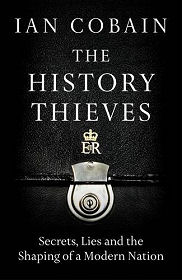 |
Some books can be put aside and forgotten when you get to the end of the last page: consigned to fill a tight space on the hardest-to-reach shelf on the bookcase you can't really access because there's a large sofa parked in front of it. Other books you keep to hand because you know you'll want to refer to them frequently. There's a much rarer class of books, however: books that you know you'll not need to refer to frequently because the message they convey is so memorable. These rarities are the books you will continue to mull over long after completion, the books whose contents will change the way you think about the world around you.
"The History Thieves: Secrets, Lies and the Shaping of a Modern Nation" by Ian Cobain is a truly memorable book that should be read by anyone who cares about Britain and its place in the modern world; or, indeed, its history since the late 1800s. It is a book whose central message will come to mind time and again, long after you've finished reading it. It is a book that will make you reinterpret events and incidents you've read about in the press, or experienced in your own life. And it is a book whose contents will probably worry you. They certainly ought to worry you. As a result it is probably not the ideal book for anyone predisposed to paranoia: though, as Joseph Heller wrote in Catch 22, "Just because you're paranoid doesn't mean they aren't after you."
Ian Cobain is an award-winning investigative journalist with the Guardian who in recent years has made something of a career out of peering into some of the darkest and least salubrious corners of official secrecy in Britain and, where he has been able within the law, exposing them to public view. (He is also this reviewer's cousin, but if this had been a poor book I'd have said so.) You'll note the caveat there: "where he has been able within the law". In essence that is what this book is all about. It tells the story of the use and abuse of the British legal system in the years since 1889 to allow the country (and in the days of Empire, other countries too) to be governed however the ruling elite saw fit from behind a protective veil of official secrecy. A veil that ensured their more unattractive and less palatable decisions and actions were unknown to the wider public at the time; or often until long afterwards; or, all too frequently, never. The title of the book comes from its inescapable conclusion. In many ways that really matter, our collective perceived history of our nation since the late 1800s has been based on an officially sanctioned and promoted version of events that is far from what really happened: or, given the widespread destruction or continuing concealment of official records over the period, what probably really happened. Our understanding of the story of our nation, our history, has been deliberately subverted; and a significantly different history, the real story of who we are today and how we have reached this point, has been stolen away and hidden from view.
The author takes us through the history of official secrecy in Britain. He then moves on to explore a series of themes that highlight the distorting effect of that secrecy in practice. We read of a war fought by the British in Oman that went on for years without anyone outside that country knowing about it; of the British involvement in 1946 (alongside Japanese prisoners they had re-armed) in kicking off what later became the Vietnam War; and of closely guarded secrets about the British conduct of military operations in Kenya. Elsewhere we hear of the widespread and large-scale destruction of official records from the end of the British Empire; of the concealment of up to 1.2 million official files outside the official (and legally compulsory ) system of government record-keeping; of the secret story of a very dirty war in Northern Ireland; and, more recently, of the industrial-scale hoovering up of digital information and communications by the British government and its allies that directly touches the lives of every one of us. Perhaps the most shocking revelations concern the officially-sanctioned secret courts that continue to dole out a form of justice behind closed doors that are sometimes themselves hidden from view. The comparison with Kafka's The Trial is inevitable, and not overlooked by the author: though as he points out, "Kafka did not conceal from his protagonist the location of the tribunal that was to decide his case, nor prevent him from learning whether or not there had been a hearing. That, perhaps, would have been a little too surreal."
This is an important book that should be read. The depth of research that underpins its various strands is immense and the sheer authority with which they are exposed to daylight is impressive. Meanwhile, the quality of the writing is outstanding. The language is accessible and approachable and in places there is a real sense of drama as events unfold. Is this a book that will change things? It should, but it probably won't. It's hard to disagree with the author's own conclusion: "As a writer and journalist, I deal in the recent and, sometimes, not-so-recent past; I generally don't do the future. Were I to make a prediction about the prospects for British state secrecy, however, I would suggest that it will continue along the trajectory that Lord Esher and Colonel Jack Seeley did so much to establish more than 100 years ago... and along which it has travelled, rarely deflected, ever since."
InformationHardcover: 368 pagesPortobello Books Ltd www.portobellobooks.com 1 September 2016 Language: English ISBN-10: 1846275830 ISBN-13: 978-1846275838 Size: 16.2 x 3.9 x 24 cm Buy from Amazon (paid link) Visit Bookshop Main Page |
